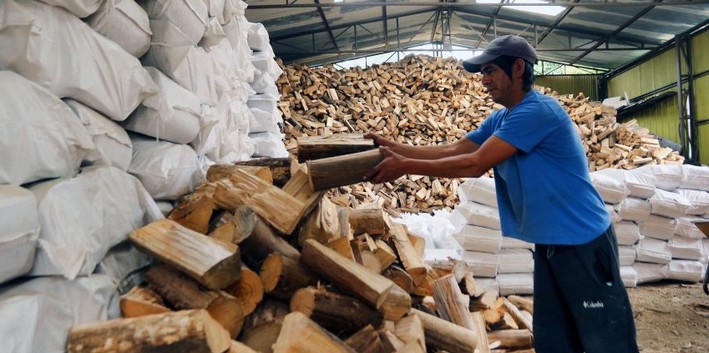- “We have no alerts indicating a supply problem for either firewood or pellets in the Region,” stated Daniela Espinoza, Regional Minister of Energy. Producers from Coronel and Concepción detailed their available supply for the season.
The Ministry of Energy temporarily ruled out a shortage of dry firewood in the Region as a result of the frontal system that prompted the declaration of a disaster zone in Biobío.
Thus, Daniela Espinoza, Regional Minister of Energy for Biobío, stated that “regarding the supply of solid biofuels in the Region, I can indicate that we have contacted a large portion of the major producers and distributors of firewood and pellets. So far, we have recorded some issues due to impacts on certain producers; however, for now, there are no effects on the supply for the Biobío Region, a situation we will continue to monitor.”
In turn, the head of the Energy portfolio in the area anticipated that “once the bad weather front has passed, we will have a more complete diagnosis, but for now, we have no alerts indicating a supply problem for either firewood or pellets in the Region. Additionally, it is very important to remind people who use biofuels that there is a registry of biofuel producers with a quality firewood seal through the Energy Sustainability Agency, which lists the addresses and phone numbers of points of sale for dry firewood with a quality seal in the Biobío Region, where we currently have 48 registered producers and distributors.”
When asked about the possibility of firewood producers affected by the storm applying for funds to acquire a kiln for drying firewood, the Regional Minister of Energy indicated that “for now, there are no open funds for firewood drying infrastructure in the Biobío Region.”
Producers and distributors
Flor Gavilán is a dry firewood distributor in Santa Juana and was one of those affected by the flooding caused by the frontal system. “Everything got wet, so we have no dry firewood left. The firewood stored in the shed was soaked because I live next to a road that flooded, and the water entered the shed,” she said.
Asked whether she had a drying kiln to explore recovery options for the firewood, the distributor from Santa Juana said, “We don’t have kilns, and the way we dry firewood is through natural methods. Last year, with the wildfires, we lost 30,000 wood chips, and Sercotec told us we needed before-and-after photos of the firewood to access aid, so I see it as difficult to get support. A while ago, we won a Corfo project, but financially, we won’t be able to activate it this year because we don’t have the funds—it was for purchasing firewood and a truck to keep working.”
Gavilán also shared that after last year’s wildfire losses, an Indap loan was forgiven, but she had another with Banco Estado that forced her to sell a truck used for product distribution. “I had to take out another loan from Indap to survive the winter and the entire season because by August, firewood sales stop, and everything becomes an investment in labor, machinery, and fuel. We’re in a very tough spot, in debt, and working just to pay off debts,” she said.
Firewood dryer
The case of JTC Maderas is different. Since 2015, they have been certified firewood producers located at Avenida Quiñenco, Parcel 13, in Coronel. They had the opportunity to access a program that allowed them to acquire a firewood dryer. “In the area where we’re located, a canal overflowed, causing extensive flooding. Here, we have our storage sheds and machinery that were nearly reached by the water, but we’ve been able to keep supplying our customers because we process firewood two years in advance—cutting it and then finishing the drying in our facilities. As an integrated biomass center in the Biobío Region, linked to a Ministry of Energy program, we secured a project that allowed us to have a custom-built firewood dryer, an innovation we commissioned. So, any damp firewood goes into the dryer, and we don’t lose the supply chain,” emphasized Ruth Morales, who founded the company with her husband, Jaime Toledo.
Regarding the type of firewood they currently sell, the founder of JTC Maderas explained, “It’s eucalyptus firewood, a mix of species ideal for combustion stoves. When dry, it lasts longer and produces strong embers. Everything we sell is packaged with a certified quality seal. We offer a 22-kilo bag for $6,000 and a net with around 20 kilos of the same quality for $5,750—prices that stay fixed year-round until stock runs out.”
Ruth Morales also noted that a high percentage of firewood sold in the area is informal, mostly high-moisture or wet firewood of unknown origin.
Meanwhile, Luis García, a quality-sealed firewood producer in Concepción (7th Street, No. 725, Villa Simón Bolívar, Barrio Norte), stated that he has faced no issues due to the frontal system. “Our firewood is all under cover, so we’ve had no problems, and it’s all dry. We started working in May this year to prepare firewood for next year—a process that takes a year, where the firewood is stored and undergoes natural drying before being moved to sheds in December and January, when moisture levels don’t exceed 25%, meeting certification standards,” he explained.
According to García, the firewood he currently has for sale is “eucalyptus in three formats: bags, chips, and large chips,” he concluded.
Source:diarioconcepcion.cl







Comments (0)
No comments yet. Be the first to comment!
Leave a comment